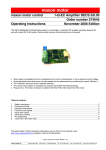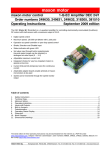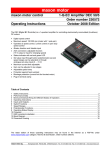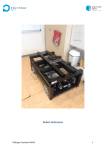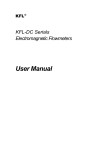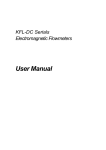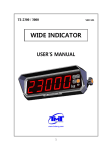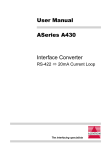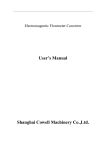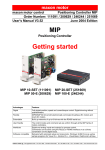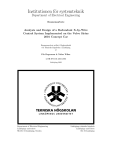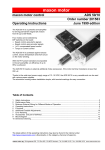Download Maxon Servo Control for Huber Goniometer Head
Transcript
maxon motor maxon motor control Operating Instructions 4-Q-DC Servo Control LSC 30/2 Order number 250521 June 2010 Edition The LSC 30/2 (Linear Servo Controller) is a linear 4-Q-Servoamplifier used to control DC motors up to approx. 50 W that are powered by permanent magnets. It allows the following operating modes: • IxR compensation • Voltage regulator • Digital encoder control • DC tacho control • Current control The required operating mode is easily selected using a DIP switch. There are also several ways of choosing the set value input: • ± 10 V to connect to layout systems, such as a positioning controller • auxiliary voltages ± 3.9 V are already provided by the LSC for use with external potentiometer • well suited for fixed speed adjustment using internal potentiometer Its wide input voltage, ranging from 12 – 30 VDC, makes the LSC very flexible for use with different voltage sources. The modular-style aluminum housing offers several fastening options, notably plugging into a 19” rack (3HE). Separable screw terminal strips and a robust controller design make the amplifier ideal for immediate use. Table of contents 1 2 3 4 5 6 7 8 9 10 11 Safety Instructions ...........................................................................................................................................2 Technical Data .................................................................................................................................................3 Minimum External Wiring .................................................................................................................................4 Start-up Procedure...........................................................................................................................................6 Inputs and Outputs...........................................................................................................................................8 Operating Status Display ...............................................................................................................................12 Error Handling................................................................................................................................................12 EMC-compliant installation ............................................................................................................................13 Block Diagram................................................................................................................................................13 Dimension Drawing........................................................................................................................................14 Spare Parts List .............................................................................................................................................14 The latest edition of these operating instructions may be downloaded from the Internet as a PDF-file under www.maxonmotor.com category Service & Downloads, Order number 250521 or in the e-shop http://shop.maxonmotor.com. maxon motor 4-Q-DC Servo Control LSC 30/2 Operating Instructions 1 Safety Instructions Skilled personnel Only skilled, experienced personnel should install and start the equipment Statutory regulations The user must ensure that the amplifier and the components belonging to it are assembled and connected according to local statutory regulations. Load disconnected For initial operation, the motor should be free running, i.e. with the load disconnected. Additional safety equipment Any electronic equipment is, in principle, not fail-safe. Machines and apparatus must therefore be fitted with independent monitoring and safety equipment. If the equipment breaks down, if it is operated incorrectly, if the control unit breaks down or if the cables break etc., it must be ensured that the drive or the complete apparatus is kept in a safe operating mode. Repairs Repairs may only be carried out by authorized personnel or the manufacturer. It is dangerous for the user to open the unit or carry out any repairs. Danger Ensure that no apparatus is connected to the electrical supply during installation of the LSC 30/2! After switching on, do not touch any live parts! Max. supply voltage Make sure that the supply voltage is between 12 and 30 VDC. Voltages higher than 32 VDC or of the wrong polarity will destroy the unit. Electrostatic sensitive device (ESD) 2 maxon motor control June 2010 Edition / Subject to change maxon motor Operating Instructions 4-Q-DC Servo Control LSC 30/2 2 Technical Data 2.1 Electrical data Supply voltage VCC.....................................................................................................12 – 30 VDC Max. output voltage.................................................................................................................25 V Max. output current Imax.............................................................................................................2 A Max. power output .................................................................................................................50 W It is advisable to consider mounting on a heat sinking surface if ambient temperature is high and there is a high power loss in the LSC ! 2.2 Inputs Set value “+Set / -Set”.......................... configurable ....................... -10 ... +10 V or -3.9 ... +3.9 V Disable “Dis IN”.................................... Disable ....................................................... min. VCC - 1 V Enable..................................................... max. Gnd + 1 V DC tacho “+T / -T” .................................................................................min. 2 VDC, max. 50 VDC Encoder signals “Ch A / Ch B” .................................................................max. 100 kHz, TTL level 2.3 Outputs Status reading “Ready” ........................ Open collector .........................max. 30 VDC (IL < 20 mA) Error .......................................... “Ready” = high impedant Ready........................................................“Ready” = Gnd 2.4 Voltage output Auxiliary voltages “+Vaux / -Vaux” ..........................+3.9 VDC, max. 2 mA / -3.9 VDC, max. 2 mA Encoder supply voltage “+Venc” ...................................................................+5 VDC, max. 80 mA 2.5 Motor connections Motor +; Motor - 2.6 Trim potentiometers nmax IxR compensation Offset Imax gain 2.7 Protection Heat monitoring of power stage ....................................................................................... T > 85°C 2.8 LED indicator green LED..........................................................................................................................READY red LED............................................................................................................................. ERROR 2.9 Ambient temperature / humidity range Operation ........................................................................................................................ 0...+45°C Storage ........................................................................................................................-40...+85°C No condensation ............................................................................................................. 20...80 % 2.10 Mechanical data Weight...................................................................................................................... approx. 330 g Mounting plate ...................................................................................................... for 4 screws M4 Dimensions .............................................................................see dimension drawing, chapter 10 2.11 Terminals separable PCB terminals ................................................................................................... 16-pole Pitch ..................................................................... 3.5 mm suitable for wire cross-section....................... AWG 28-18 0.14 ... 1 mm2 multiple-stranded; 0.14 ... 1.3 mm2 single wire June 2010 Edition / Subject to change maxon motor control 3 maxon motor 4-Q-DC Servo Control LSC 30/2 Operating Instructions 3 Minimum External Wiring 7 8 9 Gnd 6 +Venc 5 16 4 10 11 12 13 14 15 16 15 3 T/ChA 9 +T/ChB 8 14 7 Ready 6 13 5 Dis +V +Set 4 12 Vaux Set 3 Dis IN Gnd +Vaux 2 11 Motor +Vcc 1 10 +Motor 12...30 VDC 1 Power supply SigGnd Operating mode 2 3.1 Voltage Regulator 1 2 OFF ON OFF IxR IxR 1 2 Gnd +5 V Ch B Ch A 1 2 unten 13 14 15 16 ON Tacho Tacho OFF OFF ON Encoder Encoder 1 2 13 14 ON OFF ON 4 maxon motor control Current 1 2 June 2010 Edition / Subject to change maxon motor Operating Instructions 7 8 9 3 4 5 6 7 8 9 7 8 Gnd 6 +Venc Set +Set 5 T/ChA Vaux 4 +T/ChB Gnd +Vaux 3 Ready Motor +Vcc 2 Dis +V +Motor 1 1 Dis IN SigGnd Set value input 2 Set value -10 ... +10V OFF ON 8 9 +3.9V Motor turns clockwise 0V 50kΩ Motor turns counterclockwise OFF -3.9V ON 7 Motor turns counterclockwise P3 Motor turns clockwise 8 Offset OFF ON June 2010 Edition / Subject to change internal internal 7 with external potentiometer -3.9 ... +3.9 V 6 with internal potentiometer P3 5 external positive set value: motor turns clockwise negative set value: motor turns counterclockwise with external set vallue -10 ... +10 V 16 15 14 13 12 11 10 11 12 13 14 15 16 10 3.2 4-Q-DC Servo Control LSC 30/2 maxon motor control 5 maxon motor 4-Q-DC Servo Control LSC 30/2 Operating Instructions 4 Start-up Procedure 4.1 Power supply layout Any available power supply can be used as long as it meets the minimum requirements set out below. During set-up and adjustment phases, we recommend separating the motor mechanically from the machine to prevent damage from uncontrolled motion. Power supply requirements Output voltage VCC min. 12 VDC; VCC max. 30 VDC Ripple <5% Output current depending on load, continuous max. 2A The required voltage can be calculated as follows: Known values: Ö Operating torque MB [mNm] Ö Operating speed nB [rpm] Ö Nominal motor voltage UN [V] Ö Motor no-load speed at UN, n0 [rpm] Ö Speed/torque gradient of motor ∆n/∆M [rpm/mNm] Sought values: Ö Supply voltage VCC [V] Solution: VCC = UN ∆n ⋅ (n B + ⋅ M B ) + 5V n0 ∆M Choose a power supply capable of supplying this calculated voltage under load. The formula takes into account a 5 V maximum voltage drop at the power stage. 4.2 Function of potentiometers Potentiometer Function Turning direction left P1 nmax P2 IxR P3 Offset P4 Imax P5 gain 1 6 maxon motor control right P1 nmax maximum speed at maximum set value Speed lower Speed higher P2 IxR IxR compensation weak compensation strong compensation P3 Offset 1 Adjustment = 0 rpm at 0 V set value P4 Imax Current limit P5 gain Speed control gain Motor turns CCW lower min. approx. 0 A lower Motor turns CW higher max. approx. 2 A higher P3 can also be used for the set value input (see 5.1.1) June 2010 Edition / Subject to change maxon motor Operating Instructions 4-Q-DC Servo Control LSC 30/2 4.3 Adjusting the potentiometers 4.3.1 Pre-adjustment With pre-adjustment, the potentiometers are set in a preferred position. Units in the original packing are already pre-set. Pre-adjustment of potentiometers 4.3.2 P1 nmax P1 nmax 50 % P2 IxR P2 IxR 0% P3 Offset P3 Offset 50 % P4 Imax P4 Imax 50 % P5 gain P5 gain 10 % Adjustment Encoder operation DC tacho operation Voltage regulator IxR compensation Current regulator Apply max. set value (10 V or 3.9 V) and turn potentiometer P1 nmax until required max. speed is reached. Adjust potentiometer P4 Imax to required limit value. 2. Limited current in the 0…2 A range can be adjusted in linear fashion with the P4 potentiometer. Important: The limit value Imax should be below the nominal current (max. permissible continuous current) as per motor data sheet. 3. Slowly increase potentiometer P5 gain until the gain is set sufficiently high. Important: If the motor is unsteady, vibrates or makes noises, the selected amplification is too high. 4. Apply 0 V set value and adjust the motor to speed 0 rpm with potentiometer P3 Offset. Important: DIP switch S9 must be set in the “ON Д position for offset adjustment. Applicable to IxR compensation only: 5. Slowly increase potentiometer P2 IxR until compensation is set sufficiently high so that the motor speed does not drop or only drops very slightly at higher motor load. Important: If the motor is unsteady, vibrates or makes noises, the selected compensation is too high. 1. 1. 2. Adjust potentiometer P4 Imax to required limit value. Limited current in the 0…2 A range can be adjusted in linear fashion with the P4 potentiometer. Important: The limit value Imax should be below the nominal current (max. permissible continuous current) as per motor data sheet. Apply 0 V set value and adjust the motor to current 0 A with potentiometer P3 Offset. Important: DIP switch S9 must be set in the “ON Д position for offset adjustment. Note: • DIP switch S10 in position: “ON Д: Set value range -3.9 ... +3.9 V equivalent to approx. -2 ... +2 A motor current “OFF Ï”: Set value range -10 ... +10 V equivalent to approx. -2 ... +2 A motor current • In current regulator operation, potentiometers P1 nmax, P2 IxR and P5 gain are not active. June 2010 Edition / Subject to change maxon motor control 7 maxon motor 4-Q-DC Servo Control LSC 30/2 Operating Instructions 5 Inputs and Outputs 5.1 Inputs 5.1.1 Set value “Set” The set value can be applied externally via an analogue voltage or internally using potentiometer P3. If the set value is applied externally using the “+Set” and “-Set” connections, DIP switch S9 must be in the “ONД position. Two different ranges can be selected to apply an external analogue set value. The required range is determined by the position of DIP switch S10. Set value range -10 ... +10 V Input voltage range Input wiring Input impedance positive set value negative set value DIP switch S10 DIP switch S9 -10 ... +10V differential 200 kΩ (differential) (+Set) > (-Set) positive motor voltage or current (+Set) < (-Set) negative motor voltage or current OFFÏ ONÐ Use of external potentiometer Set value range -3.9 ... +3.9 V Input voltage range Input wiring Input impedance positive set value negative set value DIP switch S10 DIP switch S9 recommended potentiometer -3.9 ... +3.9 V differential 200 kΩ (differential) (+Set) > (-Set) positive motor voltage or current (+Set) < (-Set) negative motor voltage or current ONÐ ONÐ 50 kΩ (linear) Use of internal potentiometer P3 If the set value is adjusted internally via potentiometer P3, DIP switch S9 must be in the “OFFÏ” position. P3 = 50 ... 100 % (right end stop) P3 = 50 ... 0 % (left end stop) Input wiring DIP switch S10 DIP switch S9 8 maxon motor control positive motor voltage or current negative motor voltage or current (+Set) = (-Set) short-circuited optional OFFÏ June 2010 Edition / Subject to change maxon motor Operating Instructions 5.1.2 4-Q-DC Servo Control LSC 30/2 “Disable” Enabling or disabling the power stage. Release “Enable” Block “Disable” If the “Dis IN” connection is not connected or at Gnd potential, the power stage is activated (Enable). minimum input voltage Gnd maximum input voltage +1 VDC referenced to Gnd maximum input current 2 mA If the “Dis IN” terminal is connected with “Dis+V” or the voltage is higher than VCC -1V, the power stage becomes high impedant and the motor shaft freewheels and slows down (Disable). minimum input voltage VCC - 1 VDC VCC maximum input voltage 2 mA maximum input current Wiring examples: a) Switch open = “Disable”; switch closed = “Enable” “+Vcc” “Dis IN” “Gnd” 3 4k7 0.25W 4k7 0.25W 4k7 0.25W 4k7 0.25W 10 4 b) Switch open = “Enable”; switch closed = “Disable” “Dis+V” terminal [11] or “+Vcc” terminal [3] “Dis IN” 5.1.3 10 DC tacho +T -T positive tacho voltage negative tacho voltage minimum input voltage maximum input voltage Input impedance terminal [14] terminal [13] 2.0 V 50.0 V approx. 20 kΩ Speed control range: The speed range is set using Potentiometer P1 nmax (max. speed at maximum set value). For full speed control with ± 10 V or ± 3.9 V, the tacho input voltage range must be at least ± 2 V. Example for a DC-tacho with 0.52 V / 1000 rpm: 2.0 V tacho voltage is equivalent to a speed of approx 3850 rpm. If the full set value range has been used, the lowest adjustable speed with the nmax potentiometer is 3850 rpm. Lower speed ranges can be reached through a reduced set value range or by using a DC tacho with a higher output voltage, such as 5 V / 1000 rpm. June 2010 Edition / Subject to change maxon motor control 9 maxon motor 4-Q-DC Servo Control LSC 30/2 5.1.4 Operating Instructions Encoder ChA ChB Channel A Channel B Encoder supply voltage +Venc max. encoder input frequency Voltage level terminal [13] terminal [14] +5 VDC, max. 80 mA DIP switch S8 OFFÏ: DIP switch S8 ONÐ: TTL low high 100 kHz 6 kHz max. 0.8 V min. 2.0 V The maximum encoder input frequency can be selected with DIP switch S8. Standard adjustment is max. encoder frequency of 100 kHz. DIP switch S8 OFFÏ: “high" Max. input frequency is 100 kHz Encoder pulses maximum motor per revolution speed 6 000 rpm 1000 512 500 256 128 11 719 rpm 12 000 rpm 23 437 rpm 46 874 rpm DIP switch S8 ONÐ: “low" Max. input frequency is 6 kHz Encoder pulses maximum motor per revolution speed 128 2 812 rpm 64 5 625 rpm 32 11 250 rpm 16 22 500 rpm Note: To achieve good control characteristics, encoders should be operated at a small number of pulses per revolution with the DIP switch S8 in position ONÐ “low”. 10 maxon motor control June 2010 Edition / Subject to change maxon motor Operating Instructions 4-Q-DC Servo Control LSC 30/2 5.2 Outputs 5.2.1 Auxiliary voltage “+Vaux” and “-Vaux” Auxiliary voltage for supplying an external potentiometer (50 kΩ). 5.2.2 +Vaux positive auxiliary voltage Output voltage Max. output current terminal [5] +3.9 VDC referenced to Sig_Gnd 2 mA -Vaux negative auxiliary voltage Output voltage Max. output current terminal [6] -3.9 VDC referenced to Sig_Gnd 2 mA Encoder supply “+Venc” Auxiliary voltage for supplying the encoder +Venc 5.2.3 Encoder supply voltage Output voltage Max. output current terminal [16] +5.0 VDC referenced to Gnd 80 mA Status reading “Ready” The readiness or error status can be reported to a higher level control through the “Ready signal”. In normal circumstances, i.e. with no errors, the “Open Collector” output is switched to Gnd. In the event of an error (overheating), the output transistor is blocked. max. 30V “Ready” 12 Ima x ≤ 20 mA Gnd Input voltage range max. load current June 2010 Edition / Subject to change max. 30 VDC 20 mA maxon motor control 11 maxon motor 4-Q-DC Servo Control LSC 30/2 Operating Instructions 6 Operating Status Display A red and green LED shows the operating mode. 6.1 No LED Reason: • No supply voltage • Fuse faulty • Wrong polarity of supply voltage 6.2 Green LED • Supply voltage applied • No error status (overheating) 6.3 Red LED If the power stage temperature exceeds a limit of approx. 85°C, the power stage is switched off. (Disable - status). The red LED comes on and the green LED goes out. If the power stage temperature falls below approx. 60°C, the motor is restarted. (Enable - status) The red LED goes out and the green LED comes on. Reason: • High ambient temperature • High power loss in the LSC • Bad convection • Heat sinking surface too small 7 Error Handling Error Motor does not turn Speed not controlled 12 maxon motor control Possible cause of error Supply voltage VCC< 12 VDC Disable not activated Overheating disconnection active Set value input 0 V Incorrect operating mode selected Bad contact Incorrect wiring Current limit too low Encoder mode: encoder signals Tacho mode: tacho signals IxR mode: compensation incorrect Action Check terminal [3] voltage “VCC” Check terminal [10] “Dis IN” Loss output in the LSC too high Check terminal [7] “-Set” and [8] “+Set” Check adjustments at DIP switch Check terminals Check wiring Check adjustment Potentiometer P4 Imax Check “ChA” [13] “ChB” [14] sequence Check polarity “-T” [13] and “+T” [14] Check adjustment Potentiometer P2 IxR June 2010 Edition / Subject to change maxon motor Operating Instructions 8 4-Q-DC Servo Control LSC 30/2 EMC-compliant installation Power supply (+VCC - Power Gnd) • No shielding normally required. • Star point-shaped wiring if several amplifiers are supplied by the same power supply. Motor cable • No shielding normally required. Encoder cable • Although the LSC 30/2 does not have a line receiver, using an encoder with a line driver is recommended as this improves interference resistance. • Use cable shielding in electromagnetically harsh environment. • Connect shielding on both sides (LSC housing). • Use separate cable. Analogue signals (Set, Tacho, Vaux) • No shielding normally required. • Use cable shielding with analogue signals with small signal level and electromagnetically harsh environment. • Normally connect shielding on both sides (LSC housing). Place shielding on one side if there are 50/60 Hz interference problems. Digital signals (Disable, Ready) • No shielding necessary. In practical terms, only the complete equipment, comprising all individual components (motor, amplifier, power supply unit, EMC filter, cabling etc.) can undergo an EMC test to ensure interference-free CE-approved operation. 9 Block Diagram -Vaux Sig Gnd +Vaux Dis +V Dis IN Ready +5V DIP10 -3.9V/2mA +3.9V/2mA +3.9V +Vcc +Venc Supply -3.9V +Set value -Set value +Vcc 12-30VDC Control & Protection Logic DIP7 Gnd +5V/80mA Gnd P5 gain P4 I max PI Speed Control Current Limit DIP8 Ch A DIP6 F/V Converter Ch B PI Current Control +Motor Linear Power Stage -Motor DIP1 +Tacho -Tacho DIP5 DIP9 P1 n max P3 Offset P2 IxR DIP3 Current Detector DIP4 Voltage Detector DIP2 June 2010 Edition / Subject to change maxon motor control 13 maxon motor 4-Q-DC Servo Control LSC 30/2 Operating Instructions 10 Dimension Drawing Dimensions in [mm] 11 Spare Parts List 14 maxon motor control maxon motor order number Designation 282310 16 poles pluggable PCB connector pitch 3.5 mm June 2010 Edition / Subject to change














